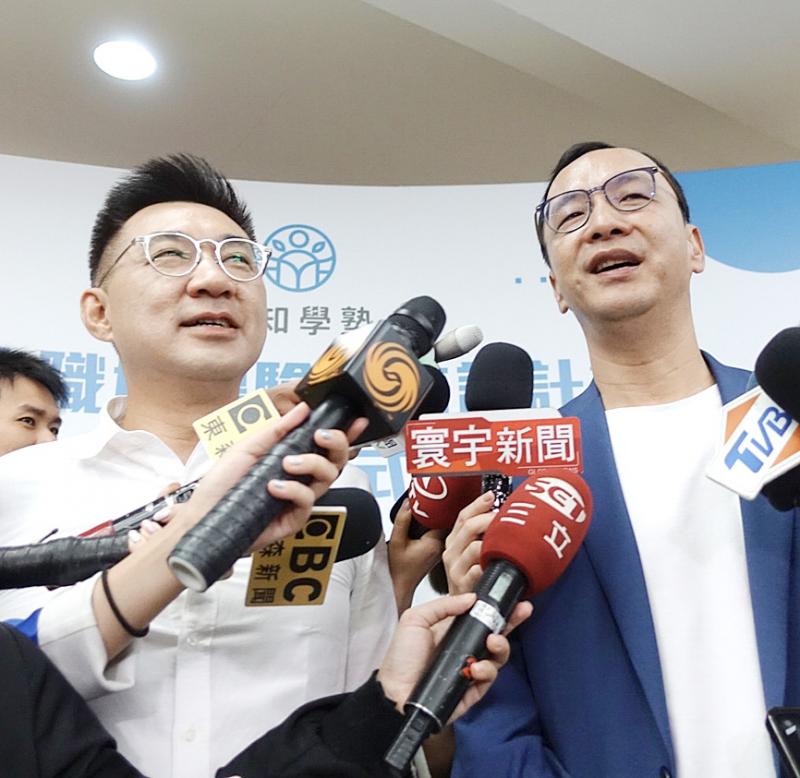The Chinese Nationalist Party’s (KMT) core values are the Republic of China (ROC) Constitution and the ideas it champions, KMT Chairman Johnny Chiang (江啟臣) said yesterday.
Chiang made the remarks at a ceremony to certify the chairs of the party’s chapters in Taipei’s 12 districts.
The Constitution promotes freedom, democracy, equality and human rights, as well as a government “of the people, by the people, for the people” Chiang said.

Photo: Shen Pei-yao, Taipei Times
Acknowledging the existence of the ROC is the basis of the “one China, different interpretations” component in the “1992 consensus,” based on which Taipei and Beijing inked 23 agreements, he said.
The so-called “1992 consensus,” a term former Mainland Affairs Council chairman Su Chi (蘇起) in 2006 admitted making up in 2000, refers to a tacit understanding between the KMT and the Chinese government that both sides of the Strait acknowledge there is “one China,” with each side having its own interpretation of what “China” means.
Some people suspect that the KMT has lost sight of its central belief, but such suspicion is unnecessary, he said, calling on KMT members to proclaim their intention to defend the ROC and the Constitution.
The KMT has encountered many challenges since the start of this year that merit change, which can only be implemented by the party headquarters shedding its power, empowering local chapters and engaging with the public, he said.
If the KMT wins the Kaohsiung mayoral by-election on Aug. 15, it would “bring itself back from the dead,” he said, calling on local chapters to aid the party in the election by calling Kaohsiung residents.
Separately, former New Taipei City mayor Eric Chu (朱立倫) yesterday brushed off comparisons to Chinese grand chancellor Cao Cao (曹操) of the Three Kingdoms period that suggest Chu wields the most influence in the KMT, as well as rumors that Chiang and former Kaohsiung mayor Han Kuo-yu (韓國瑜) are forming an alliance against him.
“People must have watched too much TV during the COVID-19 pandemic and have gone overboard,” Chu told reporters. “It is not like hundreds of years ago. The nation is the ROC now.”
“Brother Johnny and I have always agreed to work together” not just within the party, but also when rallying external forces to the KMT’s cause, he said.
There is no point fighting at a time when the KMT is a weak, minority party, he said, adding that the party would be pathetic if it bowed to the Democratic Progressive Party’s (DPP) divide-and-conquer tactics.
There is not an “anti-Chu alliance,” only an “anti-DPP alliance,” Chu said, adding that the KMT’s top priority is to foster young and ambitious talent.

An essay competition jointly organized by a local writing society and a publisher affiliated with the Chinese Communist Party (CCP) might have contravened the Act Governing Relations Between the People of the Taiwan Area and the Mainland Area (臺灣地區與大陸地區人民關係條例), the Mainland Affairs Council (MAC) said on Thursday. “In this case, the partner organization is clearly an agency under the CCP’s Fujian Provincial Committee,” MAC Deputy Minister and spokesperson Liang Wen-chieh (梁文傑) said at a news briefing in Taipei. “It also involves bringing Taiwanese students to China with all-expenses-paid arrangements to attend award ceremonies and camps,” Liang said. Those two “characteristics” are typically sufficient

A magnitude 5.9 earthquake that struck about 33km off the coast of Hualien City was the "main shock" in a series of quakes in the area, with aftershocks expected over the next three days, the Central Weather Administration (CWA) said yesterday. Prior to the magnitude 5.9 quake shaking most of Taiwan at 6:53pm yesterday, six other earthquakes stronger than a magnitude of 4, starting with a magnitude 5.5 quake at 6:09pm, occurred in the area. CWA Seismological Center Director Wu Chien-fu (吳健富) confirmed that the quakes were all part of the same series and that the magnitude 5.5 temblor was

The brilliant blue waters, thick foliage and bucolic atmosphere on this seemingly idyllic archipelago deep in the Pacific Ocean belie the key role it now plays in a titanic geopolitical struggle. Palau is again on the front line as China, and the US and its allies prepare their forces in an intensifying contest for control over the Asia-Pacific region. The democratic nation of just 17,000 people hosts US-controlled airstrips and soon-to-be-completed radar installations that the US military describes as “critical” to monitoring vast swathes of water and airspace. It is also a key piece of the second island chain, a string of

The Central Weather Administration has issued a heat alert for southeastern Taiwan, warning of temperatures as high as 36°C today, while alerting some coastal areas of strong winds later in the day. Kaohsiung’s Neimen District (內門) and Pingtung County’s Neipu Township (內埔) are under an orange heat alert, which warns of temperatures as high as 36°C for three consecutive days, the CWA said, citing southwest winds. The heat would also extend to Tainan’s Nansi (楠西) and Yujing (玉井) districts, as well as Pingtung’s Gaoshu (高樹), Yanpu (鹽埔) and Majia (瑪家) townships, it said, forecasting highs of up to 36°C in those areas